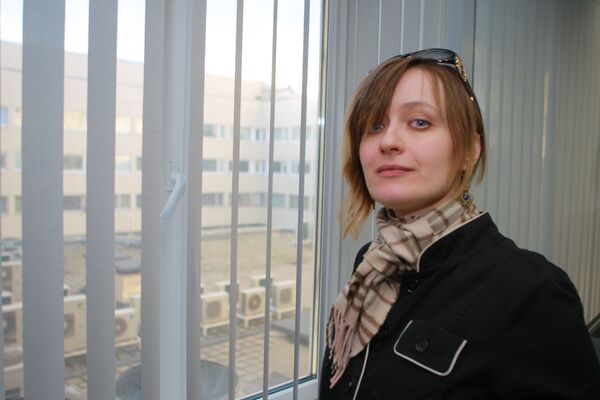I’ve run into Vladimir Pozner, one of Russia’s most eminent journalists, just once so far.
It was at a movie premiere. I was still breastfeeding my son, so had to use a breast pump whenever I went out in the evenings.
Having performed my motherly duty discreetly out of sight, I emerged into the main hall exhausted, and remember being very irritated by a colleague calling with a complicated work-related question.
“Look, I’m at a movie premiere, and instead of mingling, I have to pump breast milk!” I nearly shouted into the telephone. “I feel like a farm animal, and I’m TIRED! Call back tomorrow!”
That was when I realized that a clearly amused Pozner was standing right next to me, trying to pretend he hadn’t heard a thing. I could feel my face flush as I walked away, despondent.
“And now I’ve embarrassed myself in front of Pozner!” I wailed to my colleague after making sure I’d reached a safe distance. “That’s it! My evening is ruined! Possibly my life as well!”
Months later, I realized that Pozner may well not have heard a thing – and that my sleep-deprived and hormone-addled state had simply got the best of me.
It was a comforting thought, because the longer I spend in Russia, the more I come to admire Pozner – as one of the few people on television who tells it like it is.
Born in Paris, raised in the United States and the Soviet Union, Pozner is a weirdo in the best sense of the word – someone who may well exemplify the eventual decline of the very concept of nationality, someone who, to quote Zadie Smith, exemplifies “the feeling of belonging nowhere that comes to people who belong everywhere.”
Just the other day, Pozner earned praise by voicing his mistrust of the Investigative Committee following the controversial arrest and alleged torture of dissident Leonid Razvozzhayev – and for doing it right on his Channel One show.
The fact that the mere existence of a show like Pozner’s continues to raise eyebrows is a testament to how badly state-run television is doing. And I don’t mean in terms of ratings, but in terms of credibility.
The same issues of credibility plague the justice system, and this is something that Pozner is not shy to point out.
“How can the people believe you, when for the last ten years, it’s been strenuously shown – and proven – that there is no justice in the country?”
That was the question Pozner addressed to Investigative Committee spokesman Vladimir Markin, who seemed surprised that the official version of events, i.e. that Razvozzhayev confessed to plotting mass unrest in Russia and had certainly not been tortured, was not being embraced by many members of the public.
Pozner went on to cite the fact that, for example, a woman can strike two pedestrians with her car, killing one and leaving one permanently disabled – and can delay serving prison time for 12 years, because she has a small child at home.
The case he had in mind was that of Anna Shavenkova, who was speeding when she struck the pedestrians, and who spent her time immediately after the incident inspecting the damage to her car rather than offering to help those injured. Naturally, Shavenkova’s mother is an influential political figure.
As Pozner went on to note, two other female convicts – Pussy Riot members Nadezhda Tolokonnikova and Maria Alyokhina – also have small children at home.
What they don’t have are influential mothers.
And even though Tolokonnikova and Alyokhina have not killed or maimed anyone, they were swiftly sentenced to two years in a penal colony, with no option of delaying their sentences.
Whatever you may think about Pussy Riot or Razvozzhayev, you have to admit that well-connected people are simply treated differently in the courts.
Russia is not at all unique in this, of course, but what is disturbing is the comparative lack of dialogue on the issue.
With all its big-budget pageantry and deliberate avoidance of hard politics, state TV needs someone like Pozner. It needs someone cool and sarcastic, not a foaming-at-the-mouth partisan activist. Ultimately, it needs someone completely devoid of embarrassing servility.
A free man, in other words. And free men are, to paraphrase another writer, hard to find.
The views expressed in this article are the author's and do not necessarily represent those of RIA Novosti.
Trendwatching in Russia is an extreme sport: if you’re not dodging champagne corks at weddings, you’re busy avoiding getting trampled by spike heels on public transportation. Thankfully, due to an amazing combination of masochism and bravado, I will do it for you while you read all about it from the safety of your living room.
Natalia Antonova is the deputy editor of The Moscow News. She also works as a playwright – her work has been featured at the Lyubimovka Festival in Moscow and Gogolfest in Kiev, Ukraine. She was borxn in Ukraine, but spent most of her life in the United States. She graduated from Duke University, where she majored in English and Slavic Literature. Before coming to Moscow, she worked in Dubai, UAE and Amman, Jordan. Her writing has been featured in The Guardian, Foreign Policy, Russia Profile, AlterNet, et al.
Trendwatcher: Marrying Money - of Diamonds and Marital Rape
Trendwatcher: Modernizing Health Care – and Death Care
Trendwatcher: Is Dignity in Death Too Much to Ask?
Trendwatcher: Drunk at 200 km per hour
Trendwatcher: And She Called Me an Ugly American
Trendwatcher: The Other Night, I Met a Man Who Had No Face
Trendwatcher: The Ashes of Beslan
Trendwatcher: Talking About It

